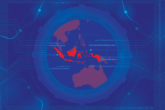January 26, 2022
‘Web3’ Is on the Way. Authoritarians Should Be Worried.
The Internet once held great promise as a means of empowering individuals, but it has become yet another path of control for bad actors. Today, authoritarian governments and companies around the world track and surveil individuals; data is not private and is sold for profit; some states algorithmically “score” their citizens; and propaganda and disinformation are rampant.
Thankfully, we are on the cusp of “Web3,” a next-generation Internet that could shift the balance back toward individuals.
If the United States embraces Web3, it could also offer a pivotal advantage in its ongoing competition with authoritarian states, especially China.
What is Web3? To understand, it helps to go back to the beginning.
Think of Web1 as the original one-way Web pages of the 1990s — static sites coupled with the dawn of widespread email. Web2 came to life as the Internet became interactive, allowing users to log in and create their own content. At the same time, Google, Facebook and other massive tech platforms hosted “free” services in exchange for our data. Over subsequent decades, of course, the Internet has continued to advance and grow more sophisticated, but we mostly still operate in a Web2 world.
Now, we are closing in on a new version of the Internet — Web3 — built on the blockchain, a technology that makes it possible to transact data securely, and smart contracts, which allow users to make agreements without relying on intermediaries — it’s what permits you to pay a vendor directly using cryptocurrency, no bank required. Web3 is still being developed and defined, but it’s clear that, fundamentally, it will offer a more decentralized version of the Internet.
Read the full article from The Washington Post.
More from CNAS
-
Siliconsciousness: The AI Competition: Public Policy Strategies: Part 1
This episode comprises the first part of our special event, “The AI Competition: Public Policy Strategies”. The event, co-hosted by MIT Technology Review, brings together some...
By Dr. ED McGrady
-
How Drones in Ukraine Are Reshaping War
Samuel Bendett, a senior adjunct fellow at the Center for a New American Security, joins The Cipher Brief to discuss the current situation of drones being used in Ukraine.Watc...
By Samuel Bendett
-
Countering the Digital Silk Road: Indonesia
This year marks the 10th anniversary of the Digital Silk Road (DSR), China’s ambitious initiative to shape critical digital infrastructure around the world to advance its geop...
By Vivek Chilukuri & Ruby Scanlon
-
How Secure Is America’s AI Advantage?
https://www.youtube.com/watch?v=7njJkH7XRa8...
By Paul Scharre



